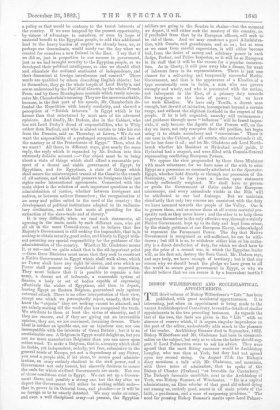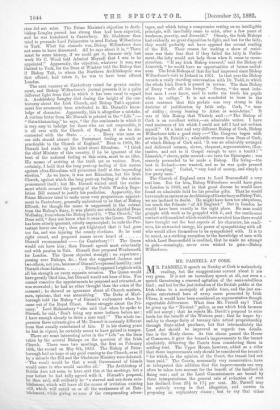BISHOP WILBERFORCE AND ECCLESIASTICAL APPOINTMENTS.
THE third volume of Bishop Wilberforce's " Life " has been- published, with great accidental opportuneness. It is interesting, just when an appointment is being made to the vacant Archbishopric of Canterbury, to read the details of similar appointments in the two preceding instances, As regards the last of the two, the facts are given in the " Life " with an absence of reserve which, if it argues singular imprudence on the part of the editor, undoubtedly adds much to the pleasure of the reader. Archbishop Sumner died in September, 1862. Bishop Wilberforce and Mr. Gladstone had been in communi- cation on the subject, but only as to whom the latter should sug- gest, if Lord Palmerston were to ask his advice. They were agreed that the most fitting successor would be Archbishop Longley, who was then at York, but they had not agreed upon any second string. On August 27th the Bishop's diary mentions a talk with Mr. Gladstone, and mentions, with three notes of admiration, that he spoke of the Bishop of Chester (Graham) "as bearable for Canterbury." The Bishop's favourite candidate, next to the Archbishop of York, was Bishop Sumner, of Winchester. "He is a capital administrator, an Eton scholar of that good old school dying out among us, entirely good, sound in all main points of the faith, a gentleman, and a man of surpassing prudence." The need for pressing Bishop Sumner'e merits upon Lord Palmer-
ston did not arise. The Prime Minister's objection to Arch- bishop Longley proved less strong than had been expected, and he was translated to Canterbury. Mr. Gladstone then tried to persuade Lord Palmerston to send Bishop Wilberforce to York. What the obstacle was, Bishop Wilberforce does not seem to have discovered. All he says about it is, "There must be some history, if we could get it, because only last week Sir 0. Wood told Admiral Meynell that I was to be appointed." Apparently, the objection, whatever it was, was limited to York, for the Dean of Windsor told the Bishop that if Bishop Tait, to whom the Northern Archbishopric was first offered, had taken it, he was to have been offered London. The next vacancy at Canterbury raised far greater excite- ment, and Bishop Wilberforce's journal presents it in a quite different light from that in which it has been usual to regard it. Archbishop Longley died during the height of the con- troversy about the Irish Church, and Bishop Tait's appoint- ment has commonly been attributed to Mr. Disraeli's know- ledge of character. Apparently, this is altogether a mistake. A curious letter from Mr. Disraeli is printed in the "Life " :— "Notwithstanding," he says, "the fine sentiments in which it is very easy to indulge for those who are not responsible, it is all over with the Church of England, if she be dis- connected with the State Every wise man on our side should attract the Protestant feeling as much as practicable to the Church of England." Even in 1868, Mr. Disraeli had made up his mind about Ritualism. "I think the chief Minister of this country, if he be ignorant of the bent of the national feeling at this crisis, must be an idiot. His means of arriving at the truth are so various. Now, certainly, I hold that the long pent-up feeling of this nation against ultra-Ritualism will pronounce itself at the impending electien." As we know, it was not Ritualism, but the Irish Church, against which the long pent-up feeling of the nation pronounced itself ; but Mr. Disraeli waited until the excite- ment which secured the passing of the Public Worship Regu- lation Bill seemed to justify his prediction. Apparently, the Prime Minister tried to make some very preposterous appoint- ment to Canterbury, generally understood to be that of Bishop Ellicott, for though the name is suppressed in the extract from the Bishop's diary, it was plainly one which startled Dean Wellesley, from whom the Bishop heard it. "The Church," the Dean said," does not know what it owes to the Queen. Disraeli has been utterly ignorant, utterly unprincipled ; he rode the Pro- testant horse one day ; then got frightened that it had gone too far, and was injuring the county elections. So he went right round, and proposed names never heard of Disraeli recommended — for Canterbury I ! The Queen would not have him ; then Disraeli agreed most reluctantly and with passion to Tait. Disraeli then proposed Wordsworth for London. The Queen objected strongly ; no experience ; passing over Bishops, &c. ; then she suggested Jackson and two others, not you, because of Disraeli's expressed hostility ; and Disraeli chose Jackson Disraeli opposed Leighton with all his strength on every separate occasion. The Queen would have greatly liked him, but Disraeli would not hear of him. You cannot conceive the appointments he proposed and retracted, or was overruled ; he had no other thought than the votes of the moment ; he showed an ignorance about all Church matters, men, opinions, that was astonishing." The Duke of Marl- borough told the Bishop "of Disraeli's excitement when he came out of the Royal Closet. Some struggle about the Pri- macy." Lord Malmesbury "also said that when he spoke to Disraeli, he said, 'Don't bring any more bothers before me ; I have enough already to drive a man mad.'" The whole im- pression these extracts give of Mr. Disraeli is curiously different from that usually entertained of him. If in his closing years he lost in vigour, he certainly seems to have gained in temper.
There are some interesting notes in the "Life "on the lines taken by the several Bishops on the question of the Irish Church. There were two meetings, the first on February 10th, the second on May 6th, 1869. The Bishop of Peter- borough had no hope of any good coming to the Church, even if by a miracle the Bill and the Gladstone Ministry were defeated. "The result would be that a weak Government of friends would come in who would sacrifice all." The Archbishop of Dublin does not seem to have said this at the meetings, but a year before he had fully agreed with it. Disraeli's proposal, he. then said, will evidently be "a starved and out-down esta- blishment, which will leave all the causes of irritation existing still, which will entail on us all the weaknesses of an Esta- blishment, while giving us none of the compensating advan-
tages, and which being a compromise resting on no intelligible principle, will inevitably cease to exist, after a few years of weakness, poverty, and discredit." Clearly, the Irish Bishops had evidently no great disposition to fight, and but for the laity, they would probably not have opposed the second reading of the Bill. Their reason for making a show of resist- ance was their fear that if they failed the laity in Parlia- ment, the laity would not help them when it came to recon- struction. "If any Irish Bishop wavered," said the Bishop of Limerick, "he would have no opportunities of future useful- ness. The Irish Bishops of that day had improved since Bishop Wilberforce's visit to Ireland in 1861. In that year the Bishop records a really startling conversation with Dr. Todd, in which the whole Irish Bench is passed in review. The then Bishop of Derry " sells all his livings." Ossory, " the most indo- lent man I ever knew, used to make me teach his pupils when in college." It is not wonderful to learn in the next sentence that this prelate was very strong in the doctrine of justification by faith only. Cork, "a man of ability ; strong leaning to Arian or semi-Arian." It was of this Bishop that Whately said :—" The Bishop of Cork is an excellent writer,—an admirable writer. I have read sentences of his which I could not tell I had not written myself." Of a later and very different Bishop of Cork, Bishop Wilberforce tells a good story :—" The Congress began with service in St. Patrick's ; admirable sermon from Dean of Cork, of which Bishop of Cork said, 'It was an admirably arranged and delivered sermon, clever, eloquent, argumentative, illus- trative, and not in it Gospel enough to save a tomtit!' " Limerick," clever, quite unread—no taste for Episcopate ; was scarcely persuaded to be made a Bishop. His living—the best in Ireland—was wanted, and so he was quite pressed into accepting." Cashel, "very fond of money, and simply a low party man."
The Church of England OW08 to Lord Beaconsfield a very real loss. But for him, Bishop Wilberforce would have gone to London in 1868, and in that great diocese he would have found an admirable field for his peculiar gifts. That he would have made as eminent an Archbishop of Canterbury as Bishop Tait, we are inclined to doubt. He might have been too ubiquitous, too much the Primate "of All England." But in London he would have been exactly in the right place. No man could grapple with work as he grappled with it, and the continuous contact with mankind which would have awaited him there would have brought out the best aspects of his character, his readi- ness, his unwearied energy, his power of sympathising with all who would allow themselves to be sympathised with. It is to be noted, as a striking exception to the knowledge of men with which Lord Beaconsfield is credited, that he made no attempt to gain—seemingly, never even wished to gain—Bishop Wilberforce.


































 Previous page
Previous page